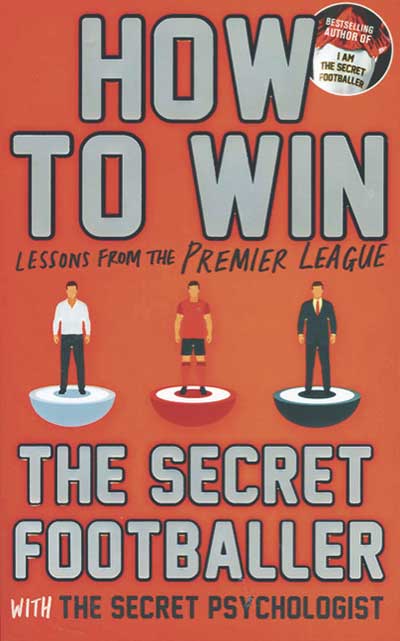Search: 'Secret Footballer'
Stories
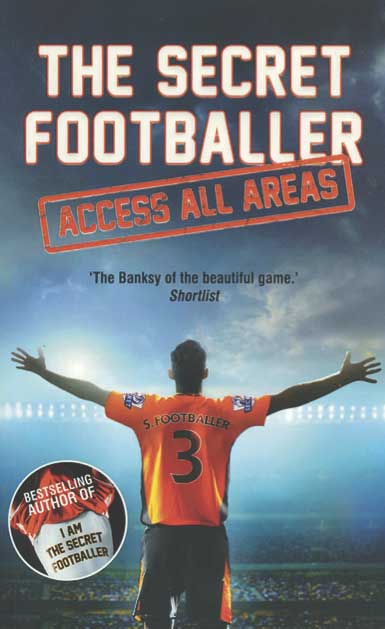 Guardian Publishing, £12.99
Guardian Publishing, £12.99
Reviewed by Si Hawkins
From WSC 351 May 2016
When the Secret Footballer embarked on his lid-lifting column for the Guardian six years ago, he presumably didn’t envisage having to stretch those trade secrets across four books, even after retirement. There’s a telling chapter here in which he repeatedly tries to quit playing, but football keeps pulling him back in, and you wonder if his publishers have been doing the same: “Dig deep, TSF, just a few more anecdotes…”
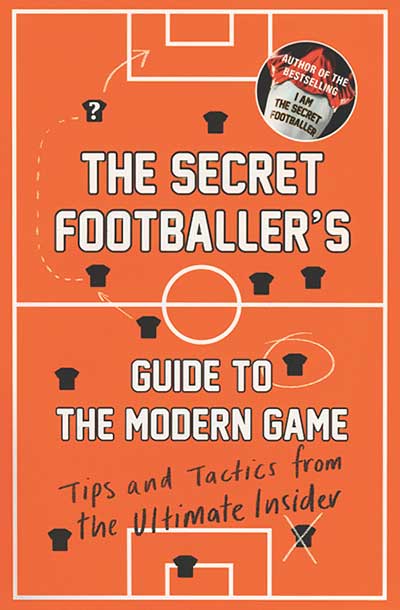 Tips and tactics from the ultimate insider
Tips and tactics from the ultimate insider
Guardian Books, £7.99
Reviewed by Roger Titford
From WSC 345 November 2015
We are in the era of 3G pitches and perhaps also 3G football biographies. In the beginning there were gentle offerings such as Goals Galore by Nat Lofthouse which told us who was there but not really how they did it. Then came the grittier school of Eamon Dunphy, Tony Cascarino, Gary Nelson et al who told us both who was there and what it was like, but not at an elevated level in the game and in a milieu that was light years away from today’s Premier League. And now we have the Secret Footballer – an artificial construct I would contend – who purports, credibly enough, to tell us what it’s like today at the top without naming many names.
This is the fourth in the Secret Footballer series or franchise, all allegedly by “the same author”. I have my doubts about that because, like many fans, I have tried to suss the identity from the clues left and hints dropped in previous books and come to the conclusion that the Secret Footballer is a composite character, a screen behind which several can hide. In this volume he even has a mate called the Secret Physio to tell us all about hamstrings and individual training programmes and another, the Secret Psycho, to offer a devastating tip on what to do if you are the fourth penalty taker in a shootout. With this formula the possibilities are as endless as the playing time on a 3G pitch.
Despite this confection I do find the Secret Footballer franchise interesting and valuable as an aid to understanding the environment in which the top players operate nowadays. This volume focuses on the aspects of fitness and playing, with chapters on psychology, formations, nutrition and equipment. Even the chapter entitled “Fashion in football” stays firmly on the pitch with a helpful analysis of the boom and bust in Claude Makélélé-alikes. The examples and arguments are current, covering the decline of 4-4-2 and the 50-50 tackle and a plausible, if mind-boggling, explanation of how Wayne Rooney’s wages are justifiable.
The writing is crisp, slick and businesslike without that edge of awfulness that belongs to the self-help business book genre, and is doubtless helped by the copywriting skills of Guardian Books. While the Secret Footballer is an experienced player I cannot see “him” retiring for a good while yet. Hunter Davies’s The Glory Game (1972) was a classic fly-on-the-wall look at the Spurs team of that era. The dressing-room chatter and the off-the-field personalities of the Premier League player today are more remote to me than that. The Secret Footballer could usefully provide another in the series that deals with all the personal, family, relationship, divorce, money, vendetta, foreign language, agent, commuting and social media pressures that the top player has to deal with – and a full list of what he actually spends all that money on.
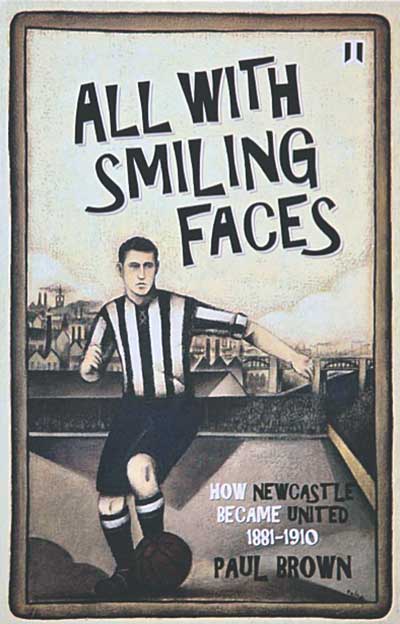 How Newcastle
became United
How Newcastle
became United
by Paul Brown
Goal Post, £10
Reviewed by Mark Brophy
From WSC 338 April 2015
Popularly, Newcastle United were founded in 1892 and in a way they were, for that was when the current name was adopted. But the club existed before that under other names, Stanley FC and Newcastle East End. This is their story from the beginnings 11 years earlier until the first FA Cup win in 1910. Though the facts are known, the first part especially has had little presence in the popular mythology of the club. Even the latter part, taking in three League titles as well as the aforementioned FA Cup win in the Edwardian era, has faded into history a little, certainly in the mind of this fan.
It’s a story which travels between two extremes, the club moving rapidly from a bunch of teenagers playing on sloping wasteground to professionals playing in the country’s top division. Along the way we learn the “United” name was pure PR. It’s commonly believed East End merged with their main local rivals West End to form Newcastle United, but East End merely took over West End’s lease on St James’ Park after they folded. The decision to change the name was meant to placate both sets of fans. There’s physical movement too, the club’s home shuffling around the city’s east end until finally settling at its present location.
The chronological tale is hung off the author’s visits in the present day to the club’s five home grounds and surrounding areas, various museums and a local theatre. The latter trip is to experience something like the atmosphere of watching the first footage filmed of the club in action, as spectators who attended the game against Liverpool in 1901 would have done later that evening, and there is atmosphere aplenty in this book. An effort is made to identify with the fans of the time, which perhaps is easy for a resident of the city and fan of the club to do. But it wouldn’t be impossible for anyone from an industrial city who supports their local team, such is the sense of community and shared experience.
This is a story about football though, with plenty of heroes. Outstanding players, shrewd secretary/managers, all spring to our attention, not least Colin Veitch, the long-serving captain of the club through their greatest days and a polymath in both the sporting and more conventional sense. He was an innovator as well as a truly versatile footballer, playing all over the pitch for Newcastle, and the book calls him “arguably the greatest player in the club’s history”. He was also a committed socialist, a founder of both the players’ union and a still-performing local theatre company, an actor and a musician.
It’s difficult in the circumstances not to contrast the drive for success in the first decade of the 20th century on display here, “boundless in its ambitious aims”, with the inertia and cynical refusal even to try for it today. For all that, this isn’t about glory. The most successful period of the club’s history is covered in only two chapters. More important is the journey, where the club came from and how they eventually got there.
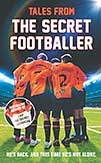 by The Secret Footballer
by The Secret Footballer
Guardian Faber, £12.99
Reviewed by John Earls
From WSC 328 June 2014
At the end of 2012’s entertaining first volume, the Secret Footballer (TSF) was binge-eating in a deliberate attempt to end his career. Nearly 18 months later he’s still playing, although the nature of his increasingly tiresome secret identity means it’s hard to gauge at what level. This time round, he’s still trying to fathom an alternative career, but his loathing of football’s machinations is making it hard to pick one.
It’s tricky to work out who TSF has most contempt for. He dismisses fans for being clueless about what really goes on in football (ironic, as his previous book was marketed as letting us rubes acquire such insider knowledge). But he also wants to avoid managing, as that involves dealing with annoying players who need constant mollycoddling “like me”. Yet the book is at its best when discussing coaching, as our man eloquently explains various tactics while taking his badges. A section on the FA’s centre of excellence is also revealing – it’s superbly stocked but effectively useless as poor design means physios can’t actually see injured players using the equipment.
Such nuggets mean it hurries along and mostly avoids feeling like offcuts not good enough for the first book, bar a pointless chapter on why his favourite player is Paul Gascoigne. Fairly conclusive evidence shortly before publication appeared to reveal TSF is Dave Kitson. So you feel conflicted when reading about an inept chairman trying to get players to waive their wages, wondering which of Kitson’s clubs it’s referring to. Or is it not Kitson, and we’re unfair in assuming it’s Portsmouth?
There is more about TSF’s personal life than before, but his vague identity means it’s hard to care about a relatively routine teenage MDMA comedown when you don’t know who’s enduring it. Whoever TSF is, he comes across as more boorish than the first book’s apparently cultured aesthete. A tale about crashing a yacht with four newly met women on board is told in a spirit of laddish high-jinx, but is as crass and misogynistic as anything TSF’s nemesis Ashley Cole could create. Nor do constant moans about paying tax make the reader think the author could be mistaken for Noam Chomsky. Every moving passage about depression is countered by one leering at players cheating on their partners. It would have been a more effective book if TSF had dropped the S, stopped trying to be a Popbitch-style nark and gone into more detail about his complex attitudes to football and his own driven nature.
If you’re after further gossipy froth such as the League Two club who cry poverty every close season yet pay their manager three times more than the rest of the division, then TSF has triumphed again. But this book’s main aftertaste is one of unease. This self-entitled author feels too liberal to bond with most of his fellow players, which paints a more undernourished image of football’s culture than any number of tabloid splashes.
